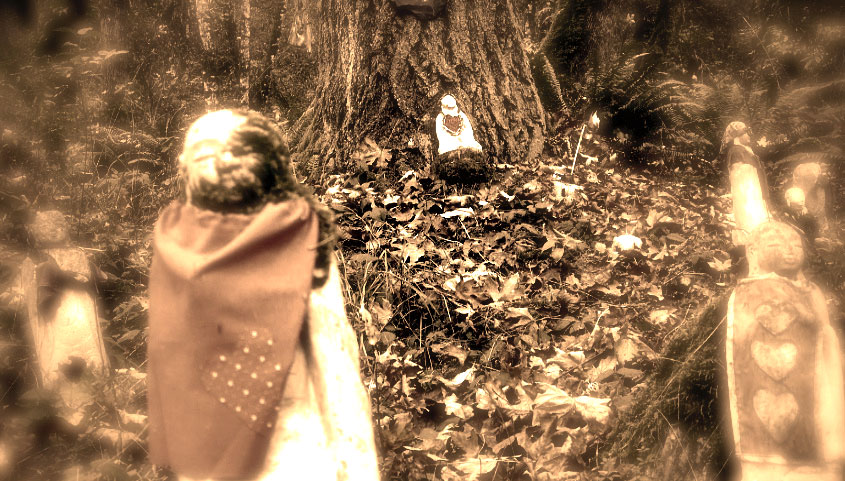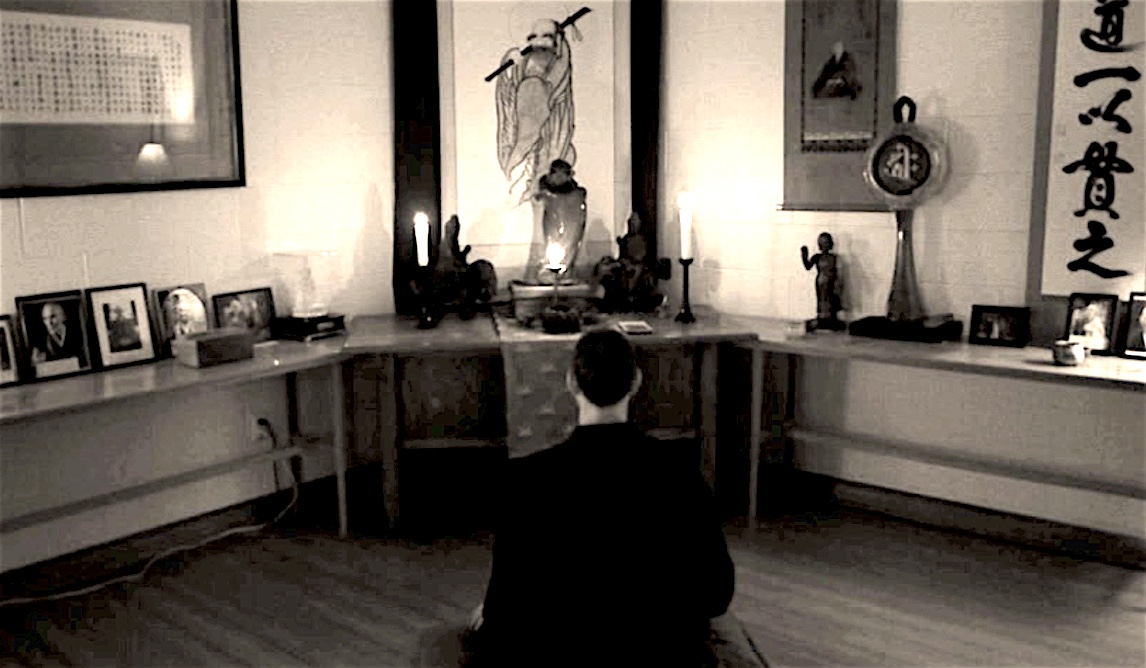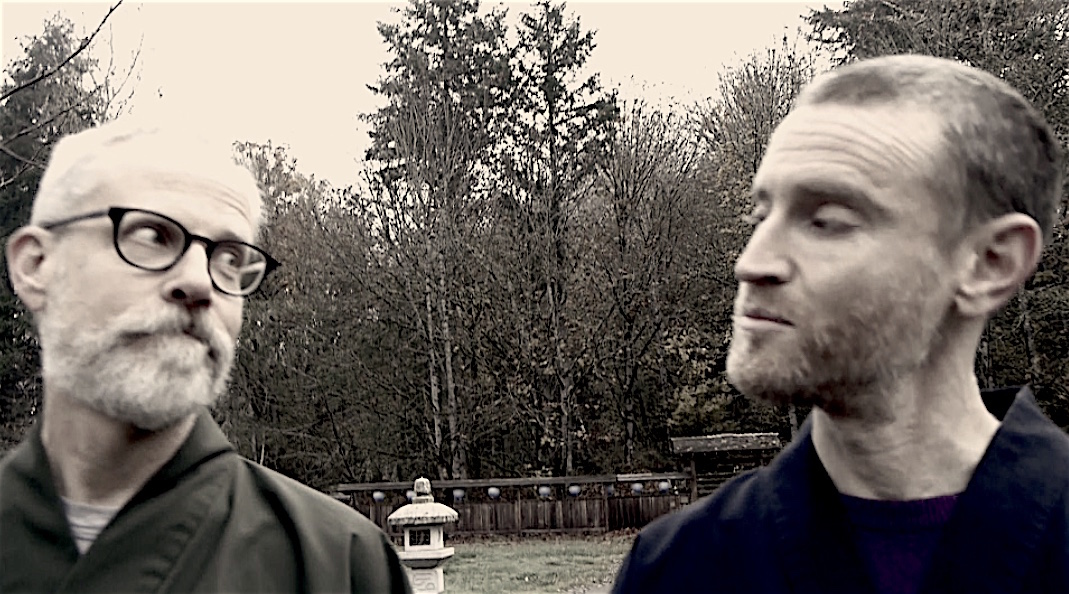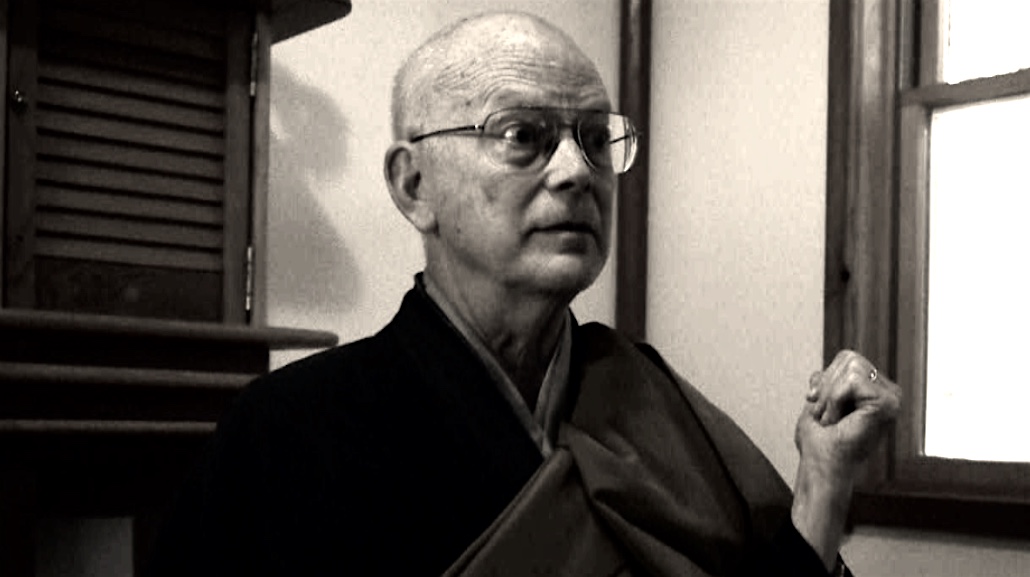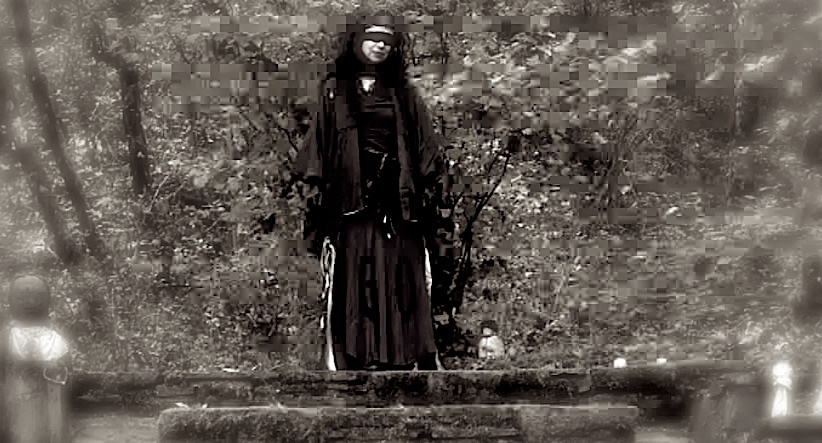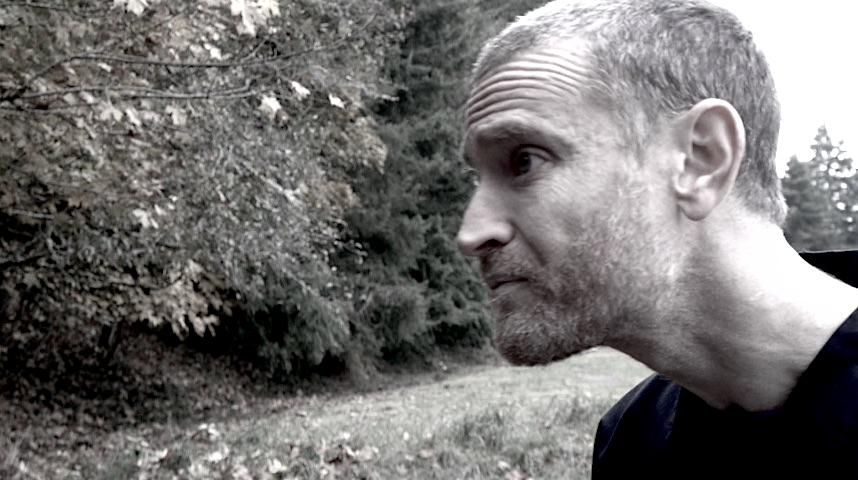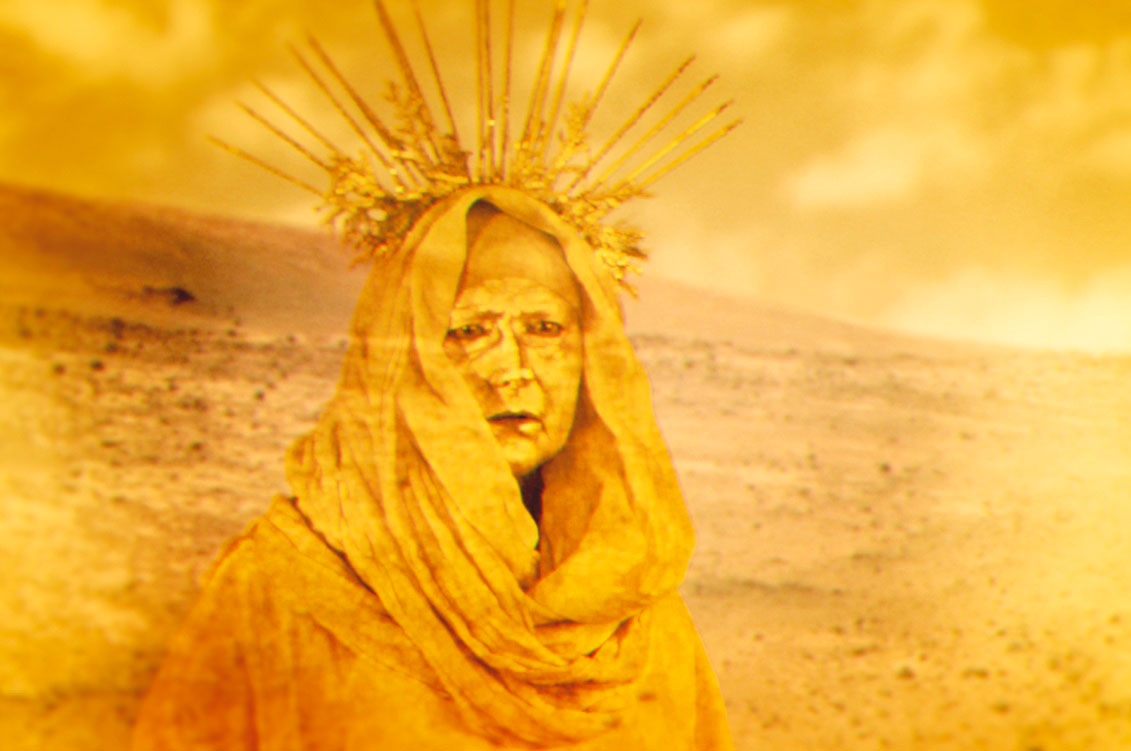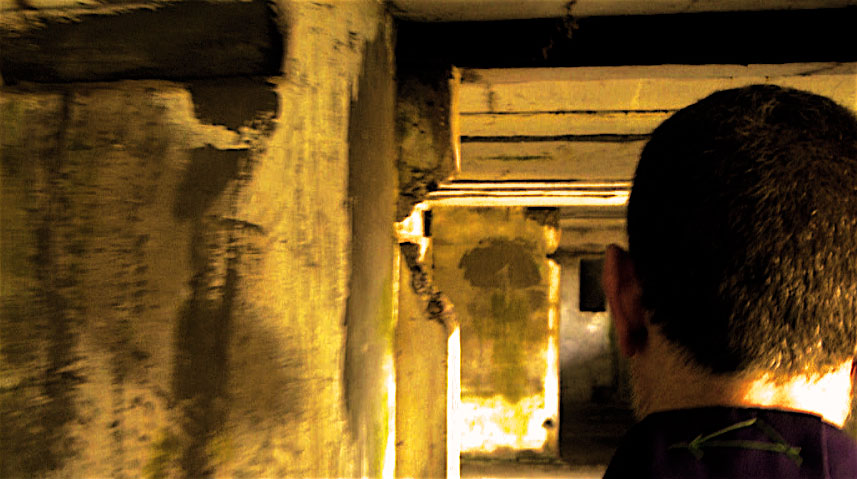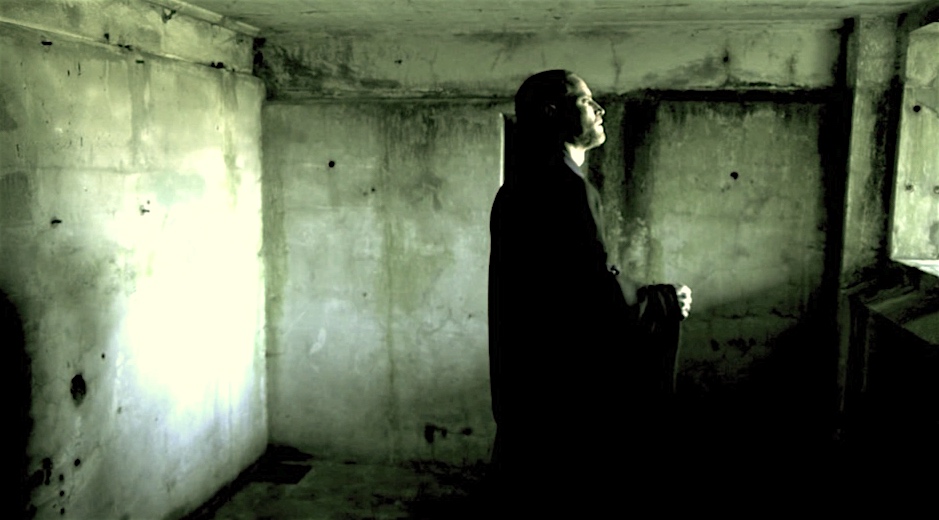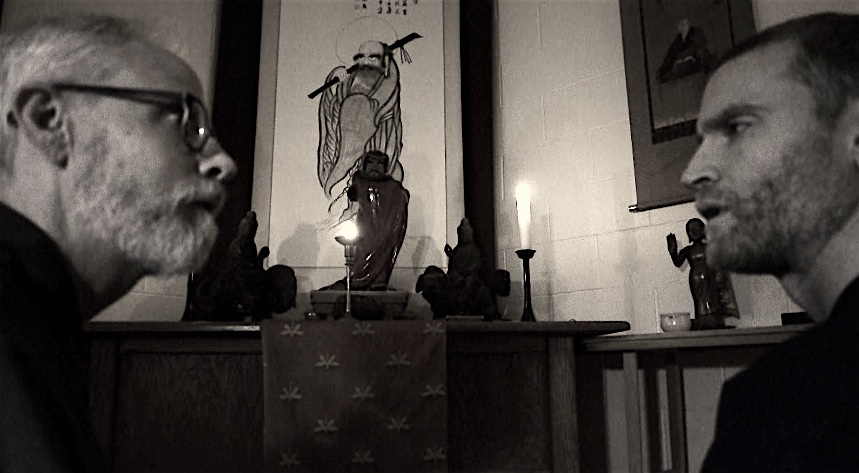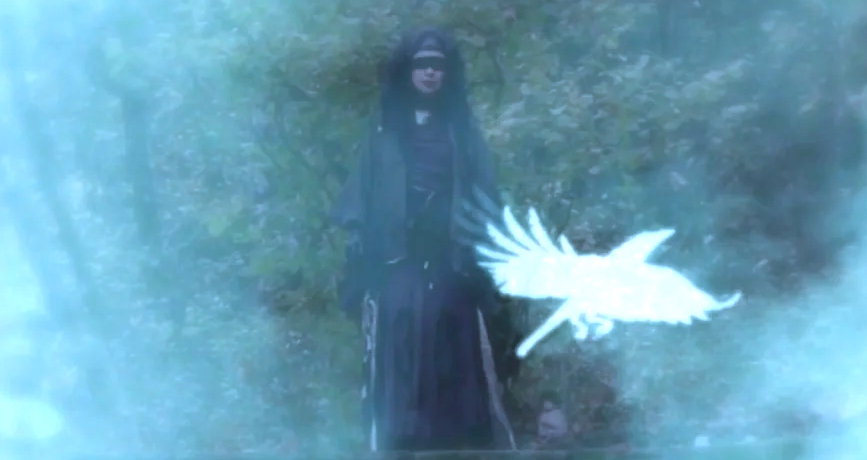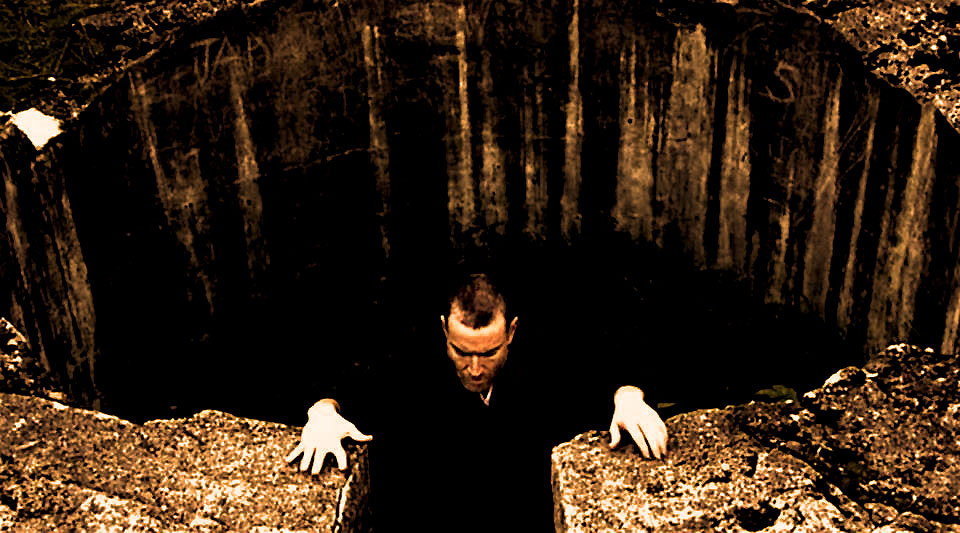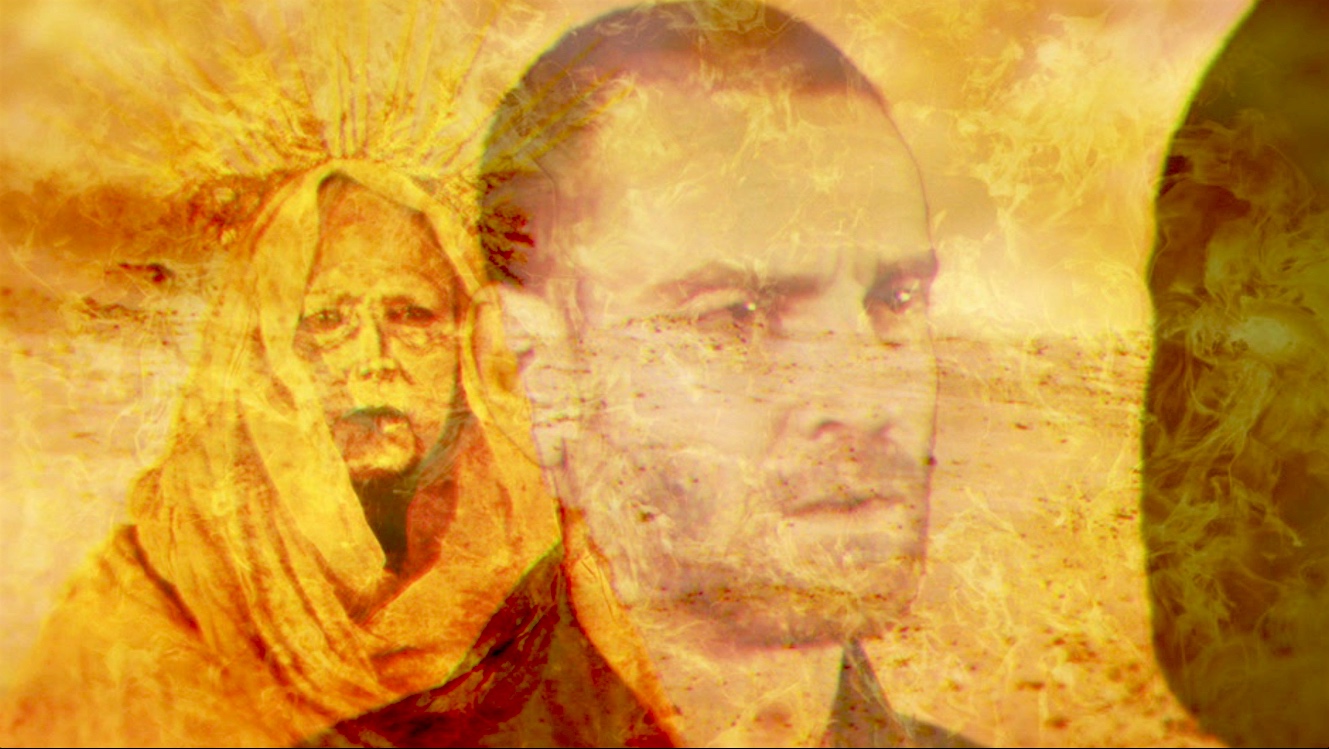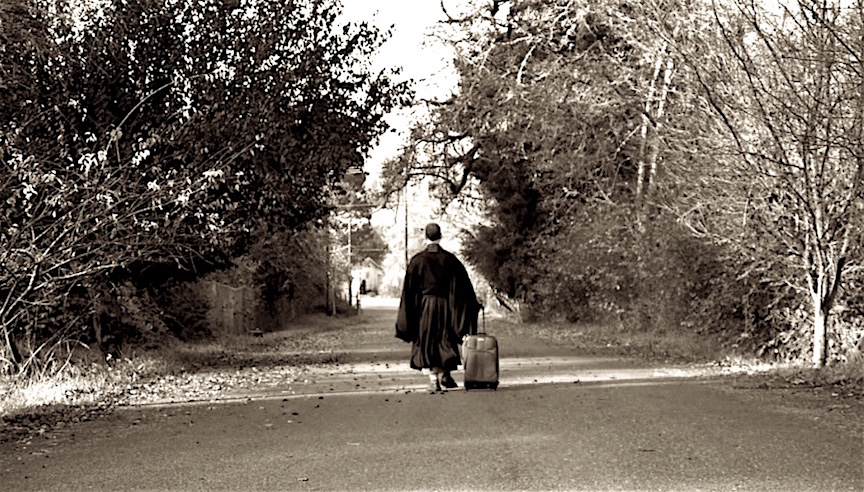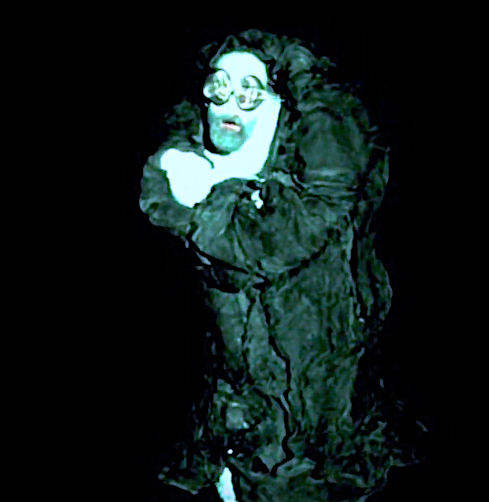~ 3 Film Reviews ~
Followed by Audience Responses
Having
seen The Vanishing Field on three different-sized screens at assorted times of day and in varied moods, I’ve found it more than rewards repeat viewings; the non-actors’ compelling performances, Sylvi Alli’s entrancing soundtrack, and lingering shots of Great Vow Zen Monastery set amid forest in Oregon, combine to induce a contemplative state. Yet the dramatisation of Jacob’s troubled reflections lends suspense. And yet Jacob’s intuition was sound. In the Roshi and a fellow monk, Tomas, he finds the fatherly love and wise guidance he must have missed out on. And we see no flesh-and-blood women at the monastery – only those who haunt Jacob’s inner vision or his subconscious: desolate souls who gesture towards death. So it’s apropos that Jacob’s rebirth – envisioned as a male shedding his skin – is facilitated by a male midwife.
Invoking ancient mysteries, Alli’s a man both of and out of his time with an urgent vision that speaks to now – but in a symbolic language geared for initiates. Impressively prolific for an artist working on a shoestring, Alli has developed a kind of shorthand – as filmmakers do – to represent inner visions, shifts of consciousness etc. As always, Alli’s work brims with ideas. Bryant, Jacob’s mom in the video within Alli’s docufiction, later reappears as Delphic oracle, her speech borrowed from a scene in a play within Chekhov’s play. This trope – the dream within a dream, not new for Alli – should resonate with anyone who’s ever ventured, or been transported, beyond this realm, footage of which is black-and-white here, contrasting other-world colour, a choice that works well and pays off beautifully at the end.
- Observer of Times -
Eastern Australia
click this to read the entire review
Jogen Salzberg (a Zen Buddhist monk, not a professional actor) stars brilliantly as “Jacob,” an intense young millennial in search of spiritual transformation in Antero Alli’s astonishingly original masterpiece. Alli uses his formidable cinematic skills to explore the interior experience of Jacob as he sits and contemplates, creating the sensation that we are actually inside Jacob’s mind experiencing his thoughts and visions. These visions are not dreams, or fantasies, but actual interior experiences of the sort that will be familiar to anybody who has spent serious time in the discipline of meditation. “Vanishing Field” is a poetic investigation of very real experience, not a science fiction fantasy.
To those unfamiliar with monastic life, it certainly appears to be dull, repetitive and commonplace. Yet, anybody who has been drawn to spend even a short time in a monastic setting will discover that it is anything but. The adventure of contemplation can be as exciting as climbing Mt. Everest. Alli and his actor monks are fully aware of this reality and confident that if they tell it true, the audience will feel it as well. And tell it true is exactly what they do.
At a mere 72 minutes long, “The Vanishing Field” is a gem of a motion picture.
Admittedly, “The Vanishing Field” may not be to the taste of the average film fan, but for anybody who has been drawn to the contemplative life, it is likely to enchant and astonish. If you are such a person, you may find it thrilling, as did I.
-
Charles Kruger for Flickstorm
click this to read the entire review
Antero Alli offers up a tour of spiritual self-deception and its resolution in his latest cinematic creation, The Vanishing Field (2020). The plot follows the protagonist, Jacob, as he searches for the perfect escape from a world in the grips of Kaliyuga (an epoch of suffering). To this end, Jacob strategizes a plan to "hack the Bardo", the Tibetan term for the liminal stages one traverses between birth, death, and reincarnation.
Seeking a method by which he might die and reincarnate in a more peaceful time, Jacob contemplates everything from psychedelics to suicide. He eventually settles upon joining a Zen Ashram, where he befriends Tomas; a grounding and diligent friend. Tomas' stabilizing influence is buttressed by the patient and incisive admonitions of a Zen teacher, whose gentle insistence upon the value of the present moment is lost on Jacob.
In his relentless pursuit to "die perfectly", Jacob forgets how to live gratefully and gracefully in the Now. His desperate urge to transcend his humanity gives rise to a series of subjective experiences which he mistakes as positive signs that he's nearing his goal. But as the story unfolds, Antero reveals to us that the certainty our presuppositions is often the herald of an unexpected revelation, one which runs contrary to our motives. In this visually stunning film, we're shown how the stepping-stones we fancy are lifting us to heaven are sometimes the stones upon which we stumble back down to earth where we belong.
I've watched this film three times so far, and I get something new out of it each time. Highly recommended!
- reviewed by Daniel Allen Kelley, New York
(Author, Behind The Veil: The Complete Guide to Conscious Sleep)
Audience Responses
If you've seen this film we'd love to read your responses;
send them to us at: verticalsource@gmail.com
The plot and characters are in a spiritual world or on a spiritual journey in ways I deeply relate to. Antero tells stories that I just don’t think anyone else is telling - or certainly CAN tell in quite the same way. The dream sequencest…the subtle realm stuff are great. I love Sylvi's the musical landscapes. I thought the zen master guy was probably the best actor in the bunch. I loved the wisdom built into that character in those scenes… it’s hard to come across a film maker or actor who can really vibrate at that level in a truthfull way. I thought those scenes really shone.
I also liked the relationship between the two ‘brothers’. I cared about them both more as they continued to connect in more meaningful ways, and in different ways. I liked seeing them argue and laugh. It made the main character much more empathetic as the film went on, because he was capable of a real connection with this friend/brother at the monastery. That really paid off at the end of course, as the main character makes his big mistake and affects his friend and cracks open for his final discovery laid out in the letter at the end of the film. I thought that ending was sweet and human and wise and kind and of course I love that. Again, not a story that I can really find anywhere else out in the world of film. Finally, I love that you get these films done with so little money and with so few resources.
James Louis Wagner
Professional actor, Los Angeles
Incredible piece!! We have to have the convo in person someday once I (perhaps we) have had more time to digest. Thank you for the honor and powerful placement of the music you used..! Straight goosebumps during the title scene and I LOOOVE the placement we he asks the brother to be with him the next time he leaves his body into their walk Montague. So amazing!
I had no idea the significance of the 3 bells waking him from his sleep as I did the noisy backing track for the cocoon scene! What a wacky coincidence I opened with the harmonics in the bass to mimic the bell (somewhat) unintentionally. I spent some time living in an ashram and i associated it with the theme. I feel like it adds an eerie dimension at the end like maybe someone's on the other end of the rope ringing another bell to GET HIM to stop breathing and when he does, someone rings a bell in ours to let him know. Very thought provoking...All hail Sylvi..! The perfect mix of angelic and demonic. She's the real deal. Inspiring!
Thaddeus Rosa
Bischofswiesen, Austria
(aka Spider the Akronaut; contributed music to this film)
Jacob seems to be like the typical lost, big-mouthed but world weary millennial. This character of Jacob resonated with me - both personally, and some aspects of my younger colleagues at work were also represented. The plan of action, "shave your head and go to a monastery", is also not foreign to me. At the monastery, I enjoyed the quietude captured in the strolls through the garden and woods, and the beauty of the living huts and the meditation room. I was really startled, in a positive way, by the down-to-earth comments of the Roshi. For example, when Jacob asks about how to handle boredom, and the Roshi answers, just look at it, here and now, what are you running away from by being "bored", that was a point to be remembered for myself. Or the Roshi's caring, attentive and compassionate comments on Jacob's OBEs, together with the immediate dismissal of any relevance (where is it now?), made it clear to me that Zen enlightenment is much tougher and harder, and has nothing to do with some bells-and- whistles-and shining lights and things meditation experience.
So in this way I understood Jacob's OBEs and his "death" in the twilight zone as the existential fear of the ego, when attacked by the Zen training. That message was conveyed beautifully and absolutely clear through the movie to me. Overall, I was very pleased with the movie. An hour spent well focused that left me quiet and thoughtful.
Peter Frey
Germany
I was taken by the out of body scenes. These kinds of scenes in your films are always the highlight for me. Each one just pulled me right in to that wavy dream space. The Oracle scene was really a trip. The dragonfly scene was also a highlight. I was enthralled by how that man moved. He must be a dancer of some kind. I didn't realize it was a dragonfly coming out of a cocoon until I read the credits. I just marveled at the weirdness of that grey blob moving like that... followed by the weirdness of the goggles and those moves. Loved the overlay of the main guy with the dragonfly and then his friend coming into that scene trying to save him. It seemed like some of that scene the men were overlayed and sometimes it seemed like they were all moving around together in the same space. Were they ever in the same space together.. all three? I had to look up the significance of dragonfly and read that it can represent the soul leaving the body. I understood that scene so much more after learning that.
- Karen Thurber
Goleta CA
"The Vanishing Field" may be my favorite Antero Alli film yet. Bold move shooting it right into the void of fear like this. Quite fitting. In The Vanishing Field, the choice of hues feels in line with the gods speaking to us thru colors, as was part of the alchemical knowledge which prevailed before rationalism took over. The out-of-body scenes are some of the best I've seen yet. The way they build on each other raised the awareness of this viewer. Magickal & inspiring! All of this carried by a beautiful soundtrack and acting by Sylvi Alli, and great work by Jogen Salzberg and Ed Welsh. By being himself, Hogen Bays, Roshi, rocks. Overall, the very direct realization I had watching the film on the hijacking of the mind ~ by ourselves and Other(s) ~ is timely. This happens thru layers of music, images and story, putting the mind to work, while making it aware of itself at the same time. Very well done.
Miriam Sluis
Willemstad, Curaçao
I could relate immediately to the main character’s desire to leave the 3D matrix and hack the Bardo. It was if I was right there with him throughout his journey over the course of the film. Not knowing how the story line would play out produced a significant deal of uncertainty in me as the viewer. Would he experience bliss, relief from the mundane struggles of life in a human vessel (my hope) if he could escape? or would be plummeted into some kind of hell realm – land of the Hungry Ghosts - and be trapped forever?
The continual return to the physical and his encounters with his monk brother and teacher solidified for me the importance of staying present to the actual moment to moment experiences in the now while also not being attached to or feeling the need to label those experiences. It highlighted the value of our authentic interactions with other humans as a vehicle of real nourishment and support (not dependence) towards building our own unique expression of living in the physical versus merely surviving or waiting for something external to change the circumstances of our experience.
I would catch myself holding my breath while watching and having to continually surrender to the unfoldment of the plot line – a terrific metaphor for life. I saw the film as the exploration of how to engage both first and second attentions in real time, continually coming back to the present moment, becoming one’s own witness, one’s own guru so to speak. Of all the location scenes, the Jizo garden and Bardo scenes were my favorite because, for me, they symbolized the beauty and terror of the unknown and perhaps the unknowable aspects of life that do not require labeling or speaking about, only to be experienced, learned from and then let go of to avoid getting stuck or becoming stagnant in the evolutionary cycle of life’s expression.
Jennifer Bruce
Oakland CA
The Vanishing Field moves the viewer into a space whereby their perception awakens to complete the experience as a whole piece of awakening the imagination. The opening scene is jarring enough in the racing words of someone exhibiting what could be perceived as either a polymath joining dots unseen, or a schizophrenic moment, which is played well by Jacob. No spoilers, many a giggle to the discerning audience who can diagnose a joke.
This film is perhaps best viewed not as an expectation of a film to feed you ideas or how you should be, it’s a mutual exchange, moving theatre that is globally accessible by breaking the fourth wall using instead of theatre space and limitations, a screen and the internet to immerse you. If you watch with the neutral passivity of a consumer you’ll not enjoy this film. Approach with open mindedness and engage to meet the art half way with your own operating system, you may bear witness to the journey of consciousness and perhaps confront the same imbalances and shocks of which the main character is trying to make sense, the senselessness begins.
Not only is the main character of Jacob struggling, he is what the Taoist teachers would term “empty vessel” The empty vessel may remain that way, or receptive to being filled with something truly special. The empty vessel nature of the main character as we follow the journey may frustrate, may seem daft, and may well act as a mirror more universal to us all than many may care to credit.
Krystyna Koseda
Musician, songwriter
Wales UK
I thought The Vanishing Field was truly poetic. There is such visual beauty in the work. Sylvi's voice and music were captivating. Your direction was perfect. It kind of reminded me of both 2001, and also something Lynchian, with much more context. That being said, it was one hell of a monastery, and practice! The guy got what he asked for in the beginning, a Bardo experience. And then I thought hmmm, alternate title: Devils Hijacked my Bardo....Because I am still thinking about the Dragonfly emerging from the Chrysalis...The Ghost and her significance "I'm not the one who needs saving" and the references to the devil or demons. And then the one who brought him to his ego death, potentially. It was a compelling view into his mind or.... Something was emerging from his unconscious and the viewer gets to interpret what that might mean.....really cool Rorschach test and just stellar movie making!
Tara C. Candoli
Los Angeles CA
I got to watch "The Vanishing Field" and got another dose of Antero trickster medicine and was reminded how much all your art and writing inspired me. I really felt how you have that skill of bringing the personal towards the universal. I had my own misguided attempt at disembodied enlightenment and the film really spoke to that experience and the emotions and feelings around it. The style of the whole film and the final scene of, 1 more time, really brought me back and was rather cathartic. His letter at the end really tied it all together. I am still processing the film a few days later and felt alot of things move inside my consciousness. Awareness to once hidden places. Thanks alot for that.
Sean Herbert
Manager, Elixart Teabar & Music Venue
Nevada City CA
A moving and provocative experience... wherein I found myself flipping between my own searching and that of the protagonist. The endpoint of discovery, as I see it in the film, and my life... being the body of the world, as veins and pathway. Each experience along the road is another waking, or blinking, of life living itself. The sound design and soundtrack are exceptional. Anyway, I was mesmerized and enthralled. What brilliant and spirited filmmaking!
Tom Sin
songwriter/musician
Seattle WA
I liked that Jacob is sort of an open book and that he has a simple sincerity and is willing to go into unknown territory. I felt like an open book myself as I was experiencing the film. I liked that I was following Jacob’s experience of not knowing what would happen when he went into trance. I believed it when he was jolted back into his body toward the end. I also liked the stretches of silence contrasting with the dialogue, the black and white, and the way color was used very specifically and evocatively. And of course, as usual, Sylvi’s soundtrack provides so much richness. Thank you!
Carole Swann
Professional actress, San Franscisco/London
Recently watched this and found it captivating. This movie presented a wonderful encounter with the challenges of what is labelled jñāna (Sanskrit: ज्ञान) . All the sidhhis or special powers and visions are nothing compared to a direct awareness of now/reality. The movie gave me as the audience, a moment of neither looking out through my eyes nor receiving through the eyes, but a direct feeling of presence. Pretty good trick.
Todd Rossman
Straburags, Latvia
I am incredibly grateful for this film which is so starkly apropos to these unprecedented times, when so many of us feel that we are looking into Death's face and even though we fear it, and have an instinct to survive...and yet also may feel like we want to escape life knowing that the times to come are so likely going to be more horrible than anything we have ever seen before. Thanks so much, Mr. Alli, for this film. It will be widely shared by me.
Demimonde Mesila Thraam
San Francisco CA
I felt challenged and mocked by my identification with the protagonist in the film. I felt as if I was him and he was me when searching to get-away-from-it-all at the onset of the film. I was in that headspace during my college years ending about 5 years ago and having lasted for almost a decade.
I really felt freed and renewed at the resolution and completion of the film how the protagonist found that where the rubber met the road of his high meditation techniques and other-worldly wisdom was in his own virtue and moral actions. The message of okay, you think you know so much, now go act on it and do some good in the world. I think this is such an important message for young people, myself included.
Devin Triantos
Bend OR
'
The long cuts in "The Vanishing Field" give moments their own life. Like the cinematography of Tarkovsky or Bergman or Malick, it gives us a look at something more like our actual experience. It gives it existence but doesn't allow us to take it for granted through normal patterns of identification. Instead of allowing us to put ourselves into the movie, we see that the movie is showing us something we only otherwise encounter as actual life: emptiness. By that I don't mean the super cosmic spiritual cloying special me big words Emptiness. I just mean an experience that doesn't resolve into a concrete identifiable. Maybe openness is a better term here.
So we have this openness, this mirror of life in these beautiful long shots. And alongside this opennes is all this symbolic imagery. I generally don't get much out of symbol heavy art. It is just lost on me. But here, I feel like the juxtaposition of these two approaches (imho) worked for me. The long open scenes invited me in and once in, without quite knowing what they intended, the symbolic scenes had more reality than i usually experience.
David Zerbst
Everett WA
This is a beautiful allegory and mysterious. It is also cautionary and an example of the importance of being grounded in the first four circuit (and having an assistant for our safety and grounding in astral explorations) before exploring the outer circuits as well as the dangers of exploring the outer circuits without realizing that you always have to go home back into your body. Always know where home is. Home is the mind and form we live in. Jacob learns but only after the death of Self.
Visually, the location (A real monastery) is a place I would certainly want to visit and spend time meditating at. It is a true face of wonder and self discovery. The film is full of symbolic imagery. Bird caws and sounds, particularly of ravens or other Corvids, are symbols of death, transformations, scavengers and also archetypical tricksters- paralleling Jacobs attachment to illusion and overcoming it. There are strong visuals to represent the out of body experiences of Jacob that are difficult to articulate . The real world is a monochrome surreal dreamscape in this film, but in oversaturated color in the etheric astral realm.
Of course, one could say that the whole world is a beautiful surreal dreamscape depending on how one views it at any moment. The resonating otherworldly score compliments and is a character in and of itself in this movie, much like most of Alli's films and paratheatrical videos. The score is beautiful and all movement is intentional. Due to the audio quality, and the Soundesign, listening with high quality headphones is recommended by this viewer for the best experience and deepest immersion into Jacobs attempt to live out the name of his vlog “Hacking the Bardo”.
Pixie Bruner
Atlanta, GA, USA
Antero Alli, filmography -- Produced by Vertical Pool
Vision Statement for "The Vanishing Field"

